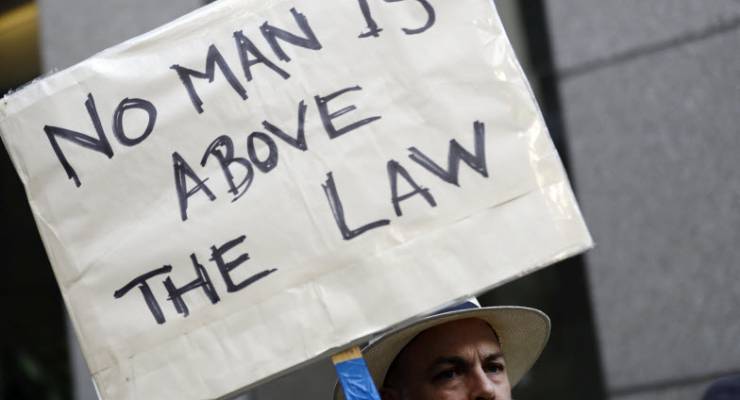
While former FBI director James Comey overnight provided chapter and verse to Congress on Donald Trump’s efforts to obstruct justice in relation to the investigation of Trump’s former national security adviser Michael Flynn, Comey also put on vivid display the hypocrisy of the security establishment about leaking when he confirmed that he was, in fact, a leaker himself:
“… the president tweeted on Friday, after I got fired, that I better hope there’s not tapes. I woke up in the middle of the night on Monday night, because it didn’t dawn on me originally that there might be corroboration for our conversation. There might be a tape.
“And my judgment was, I needed to get that out into the public square. And so I asked a friend of mine to share the content of the memo with a reporter. Didn’t do it myself, for a variety of reasons. But I asked him to, because I thought that might prompt the appointment of a special counsel. And so I asked a close friend of mine to do it.”
Comey added “as a private citizen, I felt free to share that” — though that’s an irrelevant distinction. Your duty of confidentiality doesn’t vanish once you leave a public office. Comey leaked confidential information obtained in the course of his position as a senior security official.
This is the same James Comey who said about Edward Snowden, “I have trouble applying the whistleblower label to someone who basically disagrees with the way our government is structured and operates” — even though Snowden revealed illegal surveillance activities that led to Congress winding back the surveillance powers of agencies like the NSA, just as Comey believed he was revealing illegal behaviour by the President.
This is the same James Comey who, for all his positive words about whistleblowing, presided over an organisation that handled whistleblowers so badly Congress had to intervene and impose bipartisan legislation on it. “The whistleblowers protections in the FBI have really not kept up with the rest of government, and that’s why we need a change here. The whistleblowers at the FBI should be treated the same as they are within the rest of the federal government,” the Republican sponsor of the legislation said when it was passed in December.
[Is THIS finally Trump’s Watergate?]
The issue of the treatment of — and usually, retaliation against — FBI whistleblowers was raised shortly after Comey became director in 2013, and he did nothing about it. “The old process for reporting waste, fraud or abuse at the FBI was vague, confusing and left whistleblowers with conflicting instructions for how to properly make disclosures without fear of reprisals,” a senior Republican senator said in December. “The FBI has had months to update its policies. Its failure to do so suggests a serious gap between rhetoric and reality on whistleblower protection at the FBI.”
But when Comey himself wanted to leak, to blow the whistle on an extraordinary abuse of power by Trump, that was fine. He got a friend to leak his conversation memo.
[The war on whistleblowers — it’s come to Australia]
As Crikey has pointed out for years, the pursuit of whistleblowers that went on under Barack Obama stood in stark contrast to the near-routine level of “official” leaking of secret information by officials, often for political purposes. Comey, “as a private citizen”, has created a new class of leaks. There have always been official leaks that are OK, and unofficial leaks that must lead to the prosecution of the leakers; now there are unofficial official leaks, by disgruntled former senior intelligence officials.
As Edward Snowden noted on Twitter: “Sometimes the only moral decision is to break the rules.” Perhaps Comey will now regret his words on Snowden, and rue his failure to do more to improve conditions for whistleblowers while he led the FBI.








Perhaps Comey will now regret his words on Snowden, yes, or perhaps he’ll find a way to distinguish his case from Snowden’s, however tenuous, thus avoiding any cognitive dissonance and so continuing to feel pleased with himself. I know which option I’d put my money on!
In the USA, confidentiality is highly legalistic. Comey’s notes were not classified, nor classifiable – that is, the ones he shared. Comey’s conversations with the President were not privileged or subject to an obligation of secrecy – that is, the ones he shared. The testimony shows that.
Comey was not a leaker. He breached no confidence or obligation under the USA system.
Of course, your broader point is right. How far confidence is owed, and when it is right to tell, should be balancing rather than black/white issues. But what Comey told would then still be no less than he should.
“But when Comey himself wanted to leak, to blow the whistle on an extraordinary abuse of power by Trump, that was fine. He got a friend to leak his conversation memo.”
Golden rule……. Cover your arse.
Good point, Bernard.
One of the perks/abuses of power.